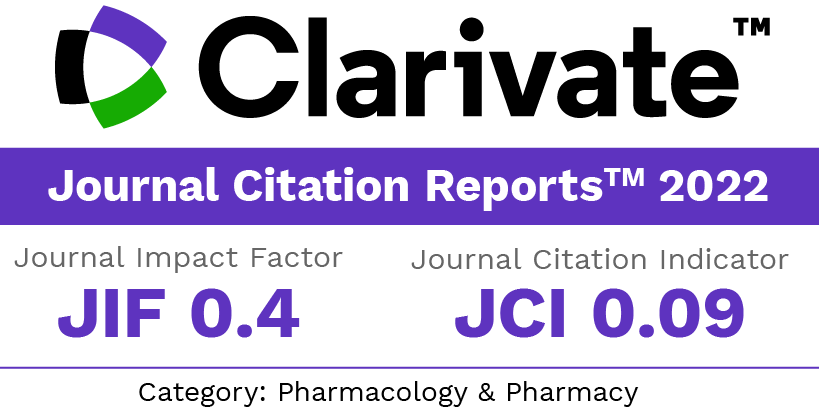Factors related to missing and rescheduling pharmaceutical care appointments by aged outpatients in a Brazilian public health setting
Keywords:
Health Services for the Aged, Appointments and Schedules, Pharmaceutical Services, Professional-Patient RelationsAbstract
Objectives. To uncover reasons why patients missed pharmaceutical care (PC) appointments, identify predictive factors to miss at least one appointment and to reschedule after a miss, and compare the rescheduling behavior of patients receiving different types of PC.
Methods. All elderly patients who had at least one scheduled appointment in the PC service of a health setting of São Paulo city, Brazil, from January to December/2011 were included. Chi-square analysis compared categorical data between groups; multivariate logistic regression models predicted attendance and rescheduling behavior.
Results. We identified 421 patients, being 221 (52.5%) non-attenders. Forgetting the appointment was the most common patient-related reason (56.3%). Illiteracy was a risk factor to be a non-attender [OR(95%CI)=2.27(1.17:4.40), p=0.015]. Patients having previous knowledge of the pharmacist presented more chance to rescheduled an appointment after the first miss compared to those who had not [OR(95%CI)=3.57(1.90:6.71), p<0.001]. Further, non-attenders who had knowledge of the pharmacist and received Medication Review with Follow-up rescheduled more than the ones receiving other types of PC (p=0.035).
Conclusion. Illiteracy predicted non-attendance in PC to aged outpatients and forgetfulness was the main reason for that. The previous acquaintance of the pharmacist and the provision of pharmaceotherapeutic follow-up explained the rescheduling behavior, which indicates the establishment of a patient-centered patient-pharmacist relationship plays a pivotal role in the continuity of the PC.
Downloads
References
Husain-Gambles M, Neal RD, Dempsey O, Lawlor DA, Hodgson J. Missed appointments in primary care: questionnaire and focus group study of health professionals. Br J Gen Pract. 2004;54(499):108–113. Available at: http://www.ncbi.nlm.nih.gov/pmc/articles/PMC1314803/pdf/14965389.pdf. Accessed April 16, 2014.
Bech M. The economics of non-attendance and the expected effect of charging a fine on non-attendees. Health Policy. 2005;74(2):181-191.
Deyo RA, Inui TS. Dropouts and broken appointments. A literature review and agenda for future research. Med Care. 1980;18(11):1146-1157.
McLeod AL, Brooks L, Taylor V, Wylie A, Currie PF, Dewhurst NG. Non-attendance at secondary prevention clinics: the effect on lipid management. Scott Med J. 2005;50(2):54-56.
Whitmarsh A, Koutantji M, Sidell K. Illness perceptions, mood and coping in predicting attendance at cardiac rehabilitation. Br J Health Psychol. 2003;8(Pt 2):209-221. Available at: http://web.b.ebscohost.com/ehost/pdfviewer/pdfviewer?sid=36a06b91-7a4f-462c-882a-6fa035961971%40sessionmgr111&vid=2&hid=123. Accessed April 16, 2014.
George A, Rubin G. Non-attendance in general practice: a systematic review and its implications for access to primary health care. Fam Pract. 2003;20(2):178-184. Available at: http://fampra.oxfordjournals.org/content/20/2/178.full.pdf+html. Accessed April 16, 2014.
Sharp DJ, Hamilton W. Non-attendance at general practices and outpatient clinics. BMJ. 2001;323(7321):1081-1082. Available at: http://www.ncbi.nlm.nih.gov/pmc/articles/PMC1121587/pdf/1081.pdf. Accessed April 16, 2014.
Good Health adds Life to Years: Global Brief for World Health Day 2012. Geneva, World Health Organization, 2012. Available at: http://whqlibdoc.who.int/hq/2012/WHO_DCO_WHD_2012.2_eng.pdf. Accessed April 16, 2014.
Cipolle RJ, Strand LM, Morley PC. Pharmaceutical care practice: the clinicians guide. New York, NY: McGraw-Hill; 2004.
Hernández DS, de Castro MS, Dáder MJF. Método Dáder: Guía de Seguimiento Farmacoterapéutico. Tercera edición, 2007. Grupo de Investigación em Atención Farmacéutica de la Universidad de Granada. Available at: http://www.ugr.es/~cts131/esp/guias/GUIA%20FINAL%20DADER.pdf. Accessed April 16, 2014. Spanish.
Waller J, Hodgkin P. Defaulters in general practice: who are they and what can be done about them? Fam Pract. 2000;17(3):252-253. Available at: http://fampra.oxfordjournals.org/content/17/3/252.full.pdf+html. Accessed April 16, 2014.
Neal RD, Lawlor DA, Allgar V, Colledge M, Ali S, Hassey A, Portz C, Wilson A. Missed appointments in general practice: retrospective data analysis from four practices. Br J Gen Pract. 2001;51(471):830-832. Available at: http://www.ncbi.nlm.nih.gov/pmc/articles/PMC1314130/pdf/11677708.pdf. Accessed April 16, 2014.
Zailinawati AH, Ng CJ, Nik-Sherina H. Why do patients with chronic illnesses fail to keep their appointments? A telephone interview. Asia Pac J Public Health. 2006;18(1):10-15.
Murdock A, Rodgers C, Lindsay H, Tham TC. Why do patients not keep their appointments? Prospective study in a gastroenterology outpatient clinic. J R Soc Med. 2002;95(6):284-286. Available at: http://www.ncbi.nlm.nih.gov/pmc/articles/PMC1279909/pdf/0950284.pdf. Accessed April 16, 2014.
Worcester MU, Murphy BM, Mee VK, Roberts SB, Goble AJ. Cardiac rehabilitation programmes: predictors of non-attendance and drop-out. Eur J Cardiovasc Prev Rehabil. 2004;11(4):328-335.
Cavalcanti RP, Cavalcanti JCM, Serrano RMSM, de Santana PR. Absenteísmo de consultas especializadas nos sistema de saúde público: relação entre causas e o processo de trabalho de equipes de saúde da família, João Pessoa – PB, Brasil. Rev Tempus Actas Saúde Col. 2013; 7(2):63-84. Available at: http://www.tempusactas.unb.br/index.php/tempus/article/view/1344/1146. Accessed April 16, 2014. Portuguese.
Informações de Saúde (TABNET) [Internet]. Brasília (DF): Ministério da Saúde, DATASUS - Departamento de Informática do SUS. 2008. Available at: http://www2.datasus.gov.br/DATASUS/index.php?area=0206. Accessed April 16, 2014. Portuguese.
Martin C, Perfect T, Mantle G. Non-attendance in primary care: the views of patients and practices on its causes, impact and solutions. Fam Pract. 2005;22(6):638-643. Available at: http://fampra.oxfordjournals.org/content/22/6/638.full.pdf+html. Accessed April 16, 2014.
Worley-Louis MM, Schommer JC, Finnegan JR. Construct identification and measure development for investigating pharmacist-patient relationships. Patient Educ Couns. 2003;51(3):229-238.
Neal RD, Hussain-Gambles M, Allgar VL, Lawlor DA, Dempsey O. Reasons for and consequences of missed appointments in general practice in the UK: questionnaire survey and prospective review of medical records. BMC Fam Pract. 2005;6:47. Available at: http://www.ncbi.nlm.nih.gov/pmc/articles/PMC1291364/pdf/1471-2296-6-47.pdf. Accessed April 16, 2014.
Gurol-Urganci I, de Jongh T, Vodopivec-Jamsek V, Atun R, Car J. Mobile phone messaging reminders for attendance at healthcare appointments. Cochrane Database Syst Rev. 2013;5;12:CD007458.
Craft S, Cholerton B, Reger M. Cognitive changes associated with normal and pathological aging. In: Halter JB, Ouslander, JG, Tinetti ME, Studenski S, High KP, Asthana S, eds. Hazzard’s Geriatric Medicine and Gerontology. New York, NY: McGraw-Hill Professional; 2009:751-765.
Cosgrove M. Defaulters in general practice: reasons for default and patterns of attendance. Br J Gen Pract. 1990;40(331):50-52. Available at: http://www.ncbi.nlm.nih.gov/pmc/articles/PMC1371138/?page=1. Accessed April 16, 2014.
Downloads
Published
How to Cite
Issue
Section
License
The articles, which are published in this journal, are subject to the following terms in relation to the rights of patrimonial or exploitation:
- The authors will keep their copyright and guarantee to the journal the right of first publication of their work, which will be distributed with a Creative Commons BY-NC-SA 4.0 license that allows third parties to reuse the work whenever its author, quote the original source and do not make commercial use of it.
b. The authors may adopt other non-exclusive licensing agreements for the distribution of the published version of the work (e.g., deposit it in an institutional telematic file or publish it in a monographic volume) provided that the original source of its publication is indicated.
c. Authors are allowed and advised to disseminate their work through the Internet (e.g. in institutional repositories or on their website) before and during the submission process, which can produce interesting exchanges and increase citations of the published work. (See The effect of open access).



















